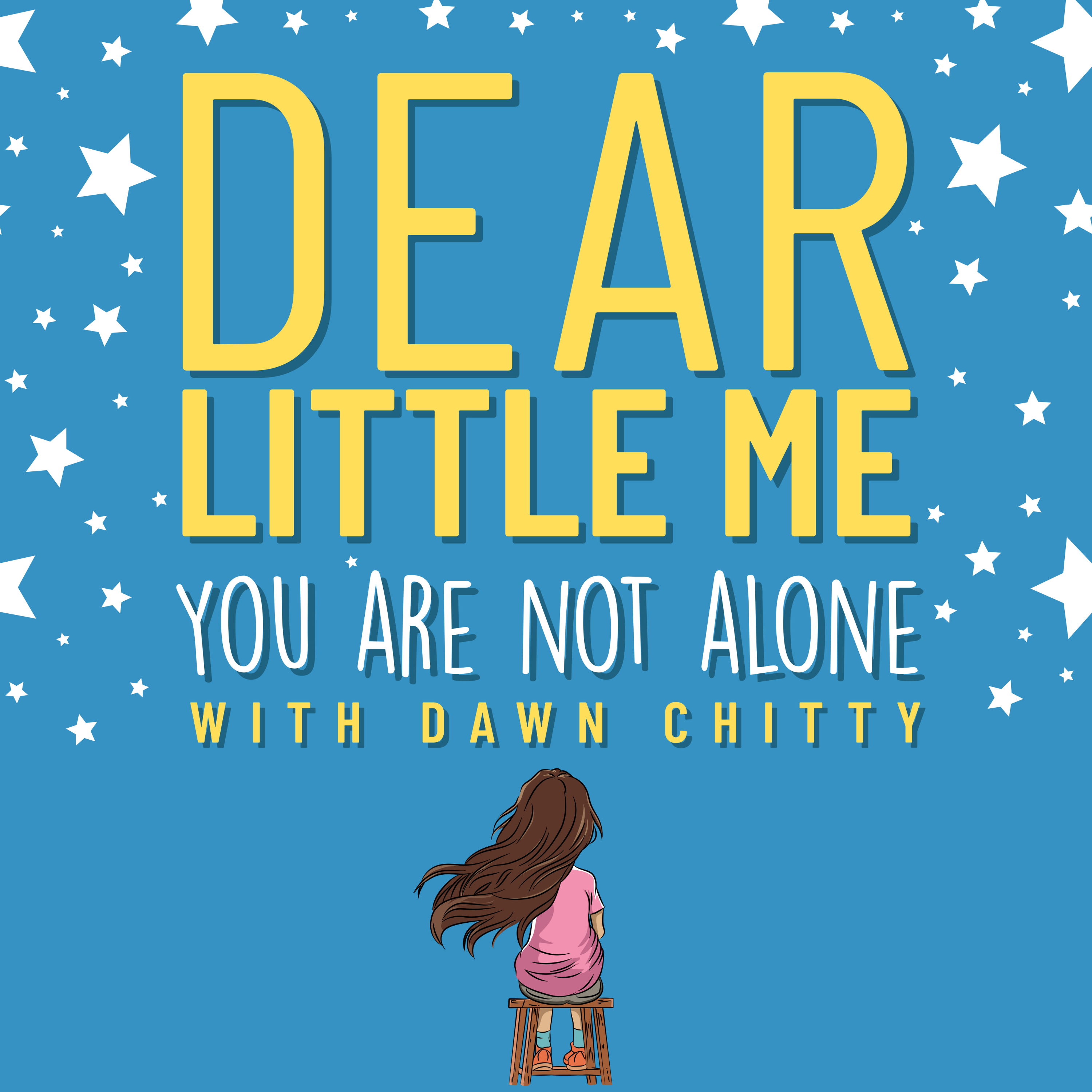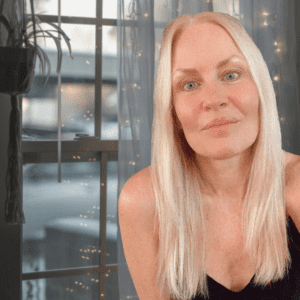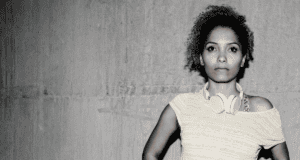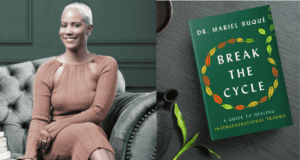What Is The Latina Mother wound?
I sat down with Mother Wound Healing Expert Michelle Gomez, who is helping black, indigenous and women of color to heal the mother wound, and asked the question What Is The Latina Motherwound? Today, Michelle shares her personal experiences with her toxic mother and what she sees as first steps towards healing.
What is the Latina mother wound and how do you see it as different to the mother wound of other cultures?
Well, being a Latina. I can speak to my experience.
I always felt there was a level of understanding of my relationship to my mother and the things that women in my culture are experiencing when we’re being brought up in the world that people outside of our culture just don’t understand.
And when I started to unpack all of that and understand it better, it really comes back to some of the systems of oppression that our people have had to live under. Which is patriarchy. A lot of our people were colonized. And so, the long term effects of colonization and patriarchy, as well as the use of organized religion, had a huge impact.
All of these systems of oppression really impacted the way women, particularly, are raised in Latino households and if you’re the eldest daughter too, it’s a totally different experience than maybe the middle child or the baby. There’s a lot more pressure on the first gen. We call ourselves first gen, because we are the first generation born in the US.
So my mother was born in Ecuador and I’m the first generation of her born here in the United States. And so yes, there is the delicate balance of trying to maintain the culture and tradition of your immigrant parents, while still trying to thrive in the U. S. being a citizen and having access to resources. Those things did the push and pull of the first gen Latina daughter and in the household it is very unique.
And when someone doesn’t understand that experience, it’s very hard for them to understand why the dynamic with mama is the way it is. And so when it comes to the Latina mother wound, I’m talking about how the systems of oppression that impacted the way our mothers were taught to raise little girls back then, reflect back to us the things that we have to unlearn.
We have to unlearn to normalize patriarchy. We have to unlearn to normalize oppressive teachings of organized religion and purity culture and even unlearn some of the expectations that we have to carry. As the first gen Latina, we have to graduate from college and go out and be something great and advance the family.
And that’s a lot of pressure to put on a daughter. So my perspective of the Latina daughter is not just what most women experience when being raised under the roof with an emotionally immature mother or a mother who is traumatized and lacks self awareness, but you add to that the deep pressure of our culture to raise daughters in a certain way. And that’s what you’re challenging. You’re not just challenging mom. You’re challenging a whole system.
*Blog Post – Mastering Boundaries – 10 Powerful Strategies
What was the relationship like between you and your mother growing up?
what is the latina mother wound?
I didn’t really know she was there. I probably have the most experience with her after my dad left because my role shifted after my dad left. So I just remember her being a wife and a mom, but my father was abusive. And he was also an alcoholic and so when he was drinking and sleeping with other women, he would come home angry, frustrated, and he would hurt my mother in front of me.
So I feel like that may be why I don’t have a ton of memories of my mother and I, in nurturing moments when I was a child because they were overshadowed by a lot of trauma. I recall that at about the age of maybe nine, between eight and 10, for sure, after my dad left, my role changed, I became more of a utility, not just with my mom, but in the family dynamic.
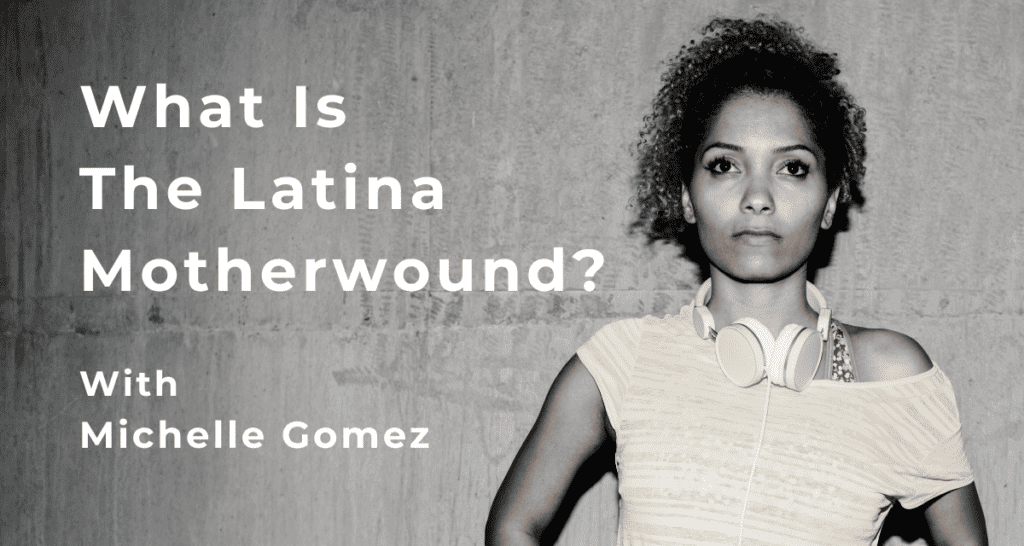
So I was the first born. I’m the first niece. I’m the first grandchild. And as the other babies started coming in – my brothers, my cousins – my role became that of a caregiver. I had to learn early on how to change diapers, make bottles, calm a child down, clean up after a child, clean up the house.
I started learning how to cook. I started all those things early on, and I noticed that, yes, I became a part of the system. I stopped being a child. So a lot of the memories I have were of being my mom’s sort of ‘partner’. But also being very afraid of her. Because she was a single mother and dealing with everything she was dealing with on her own, she was very reactive, very stressed out, very anxious. I was very aware that I had to be hyper vigilant of her moods and anticipate if she’s having a good day versus not. But it was, it was very dysregulating in a sense, because I was also left to my own devices.
For a long time, I was a latchkey kid. I remember being in the fifth grade, coming home with my little brother. He’s in kindergarten and I had a key to our duplex apartment and we would be home by about 3.30pm and my mom didn’t get home until about six.
And we were just home alone, a ten year old and a five year old, and we had to do chores. I had to do my homework. I’d help my brother with his homework and I had to start the dinner. She would come home and finish the dinner. I was always the one who started it. So that’s the role that I remember playing with her.
And I remember being that for her for many years. Even into my late teens. And that’s when things really started to shift because she started dating again and started bringing men around us as children. And I didn’t handle that well. We had been alone and without a man in our home for so long, other than my little brothers.
And that was an adjustment. So when I started to challenge her. About these men that she was bringing around, she basically kicked me out of my house when I was 19 and I felt very used. I felt very unappreciated. I felt abandoned. And I think that’s where my anger really started to kick forward.
I had to make a life for myself and I decided I would never ask for her help again. And so that really fueled a lot of my decisions. And we had a lot of years where things were okay, but always with a level of tension.
I just don’t think we knew each other very well. She knew what I could do for her. She knew what I was capable of, but she didn’t know me. She didn’t know half of the traumas I had experienced. And she didn’t know the resentment that I carried for a very, very long time.
How Did Your Relationship with Your Mother Affect Your Mental Health?
what is the latina mother wound?
Nobody talked about mental health. And I was being sexually violated by people in our family and around our family at the time.
And so for a long time, I learned to keep quiet. And keep secrets.
She needed a partnership so badly. And I just didn’t trust her to put her kids before her needs. Because I saw how deeply insecure she was. I saw how much she really, really wanted this idea of a man in a home. She would even say, ‘now I have a family’ because there was a man present.
I feel like I carried a lot of that pain from my childhood. It was almost like I wanted to show her ‘you’re not paying attention. You’re not seeing what’s happening right now!’ I couldn’t trust her to make the choices that were beneficial for us because I can see her loneliness driving her decision making.
So knowing that early on mom doesn’t see me. Mom doesn’t know what’s going on with me. Mom’s not checking in with me. Mom is not attuned to me to know something’s up. Something’s going on with my daughter, you know? And so I felt the only way I managed to get her attention was when I was doing stuff for her.
So when I could clean the house, if I helped with the meals, if I helped with the brothers, she’d be like, okay, great. I would get interaction. I also saw it with my grades. I kept my grades up. I kept winning awards, kept accomplishing things, straight A’s on a roll.
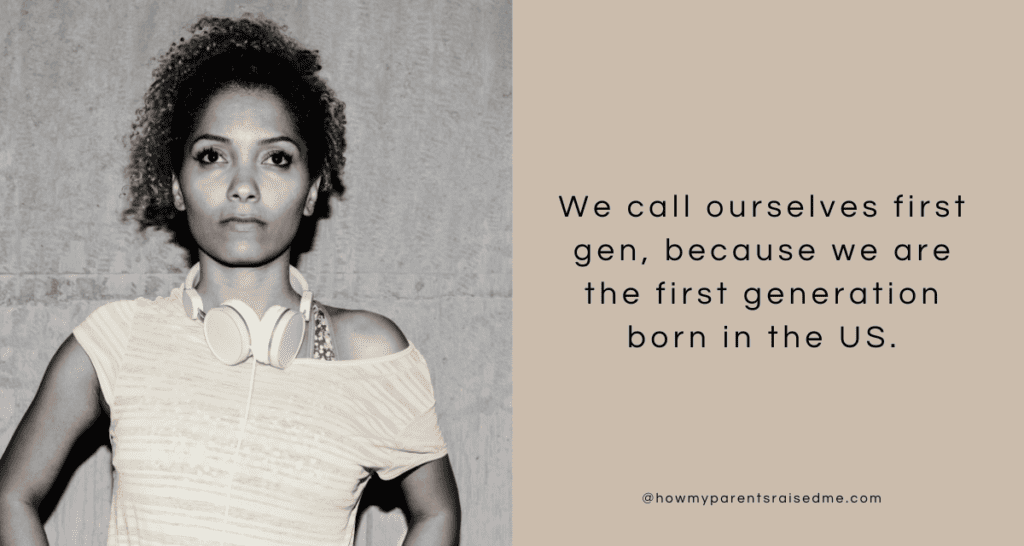
I felt like it was her way of feeling like she was doing something right. My kid is doing well academically. She’s a good kid. She doesn’t get in trouble at school. She doesn’t get into fights. I’m obviously doing something right. And that gave me a little bit of certainty, like, okay, she’s feeling confident in something.
Maybe if she builds her confidence and she feels good about herself as a mother, then she won’t feel the need to pursue men or have a man in her life because she feels like she is fulfilled. That was my ‘little girl’ way of thinking. And I did that with my father too. I thought if I was just a good kid, if I got good grades and I did well, my dad would come back and he would be a dad to me.
So it was this very performative way of handling my sadness. Strive, work, take care of others, take care of things, do everything well, don’t break the rules and all should be well. That’s where my head was at.
How Did You See The Cycles of Generational Trauma Playing Out In Your Family?
what is the latina mother wound?
I feel my mom had a lot of her own trauma that went unresolved. Nobody talked about therapy and things like that back then. It’s no wonder that even a woman who’s got kids, and she’s a whole adult, assumes that all of her problems will get fixed if she’s in a relationship. ‘I just need to find this person and I will be complete’. And so until she found that person, she was just very hard to be around a lot of the time.
I don’t think women knew their own power as feminists, back then, and how it really all starts and ends with us anyway. I think if all women would heal and get to embody their divine feminine, their inner warrior, I feel we would get to raise daughters that not only feel seen with us and feel accepted with us as their mothers, but learn how to be good women, safe women with each other.
What happened when you were abandoned by your toxic mother?
what is the latina mother wound?
I was thrown out of home, but I was ready to do whatever I had to do to stabilize myself so that I didn’t have to go back.
I was in college by then. I had a job. I had my own car. I didn’t get pregnant in high school. I’ve never been arrested. I’ve never stolen from her. I’ve never even raised my voice or cursed at her. My mom was very scary and reactive, so I knew even if I wanted to smack my lips or slam my door, just like teenagers do, it was not allowed in my home. It was not… because you would get a backhand quickly. So I knew I never disrespected her. I don’t get in trouble. I have a job. I was working full time. And going to school full time. So I was hardly home, and I had a relationship by then. I was already dating, who’s now my husband, so I was confused. I thought….because I challenged you with your decision, you are going to kick me out? But she didn’t want to hear it. And so I felt like, ‘how dare you?’
‘How dare you just throw me out because I disagree’. And it fueled a rage in me. It really lit a fire under me to do whatever I had to do so that I could never can get kicked out of anyone’s house ever again. You kick me out once… once and never again. It’s almost like that level of heartbreak and betrayal. I decided then and there, I will do whatever I have to do to take care of myself so that I never have to ask for anybody’s help. And that’s not a healthy way of being.
That’s actually what contributes to a lot of our detachment as women. Sometimes when we can’t be in sisterhood and we don’t know how, that’s when we have to learn to be in our soft girl era again. Learn to receive. When we’ve been wounded in those ways by our mothers, the walls go up, the fists go up, we get this hyper independence and it’s all out of trauma. It’s all out of pain and wounding from the very person whose body we shared at some point. So I just stuck my head to the grindstone. I worked. I found a place to stay. I continued going to school, didn’t ask my mom for a penny and I just never looked back.
I’ve been on my own ever since.
* Blog Post – Devastating Childhood Neglect – 3 Steps To Heal

What beliefs did you take away from your childhood about yourself?
what is the latina mother wound?
The biggest one I took forward was feeling that me being vulnerable and needing something was wrong, I didn’t like needing people. I didn’t like needing help. I felt perfectly okay helping others, being there for others, but I judged myself harshly. If I didn’t have what I needed for myself, if I had to ask for help? That was hard for me. So I definitely put up a lot of walls around my heart and did not allow myself to ask for help or to accept help.
Even when it was offered to me, it was very much like, ‘no, I got it’ because I was afraid of being let down. I was afraid that when you give people the opening that they know you need them and you let them help you… that they may either use that vulnerability against you, or take credit for what you’ve done. ‘you have all of this because of me, I helped you with that’. And I had such a drive of like, no! I’m going to do this for myself. My dad’s not going to take credit for it. My mom’s not going to take credit for it. No one’s going to take credit for it.
Everything I have is because of me. I put up a lot of walls and did things the hard and long way for a long time, stubbornly in an effort to prove to the world that I didn’t need anyone. So that’s what it took. And my husband definitely had to deal with a lot. Trying to understand why I was so hyper independent, why I was so offended by him wanting to help me and yet still wanting to be there for me. I would always look at him with a suspicious eye, like, why are you being so nice? Why are you so kind? And, how come you’re not getting angry at me right now? I was so used to the reactiveness of my upbringing that it was very dysregulating to be around somebody who was the polar opposite to me. And I dealt with that in friendships too. I wouldn’t let myself get too close. But there were friendships where I did let myself get vulnerable and get close to someone. And then I was betrayed or I was heartbroken. And so I would go back into my cocoon like, ‘nope, see, this is why I put my heart away in a little box. This is why we don’t let people in. See, this is why’. So that’s what I carried for a very long time, a very long time.
I’ve done a lot of healing and I’m not there anymore, but if I could sit back across the table from 22/ 23 year old Michelle, she was a tough cookie to crack. She was not someone who could easily get close to you. There was always an arm’s length like ‘okay, now you stay there, we’re good right there where you are, that’s enough’. And that’s a very lonely place to be.
Did you have any sense of what you needed after looking after everybody else’s needs your whole life?
what is the latina mother wound?
I wasn’t even aware of what I needed. I was so busy working and trying to survive and trying to set myself up so I don’t need anyone, that I didn’t really ask myself what I needed.
It wasn’t until I felt a little bit stable. When I became a mom, all the old trauma started coming up. The anxiety, the depression. All that started to come to the surface. And that’s when I said, Oh, we got to work this out. We got to talk to somebody.
So I finally reached out for help. I started working with therapists. I’ve worked with a few life coaches to unpack a lot of the trauma and the things I was experiencing. And I did that for about 11 years. I did a lot of work. But no, I didn’t know what my needs were. It was always about work, to set myself up to be okay, to survive and not need anyone. And then when it came to the children, then it became about the children. ‘Let’s take care of the children’. But I didn’t really know what I needed. I had been so used to surviving, trying to survive. And before having to survive, it was about taking care of the house, taking care of the kids, you know, my brothers, and making sure mom was happy.
So I never really knew how to ask, because think about it, if I had been in touch with my emotions and been able to speak about what I needed, I would have talked about the abuse early on, but I was so used to ‘this is my problem. This is a me problem. I can’t inconvenience others with my problem’. So I’m just going to shut up. And so I was so used to ignoring what I needed. Because it was scary to think about what I needed.
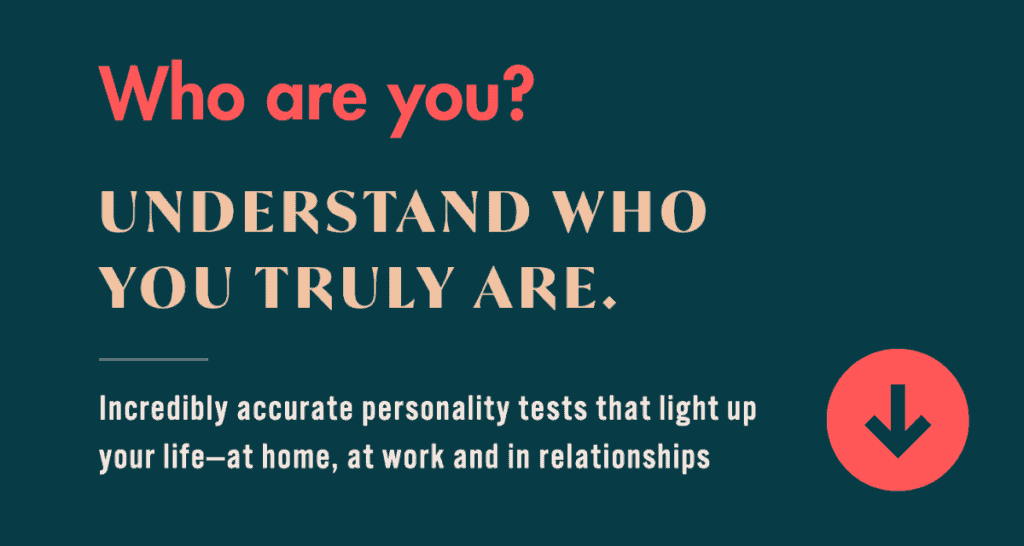
And when you were thrown out at 19, what was your relationship like with your mother after that? Were you still in contact?
what is the latina mother wound?
No, we actually went no contact for what felt like about a year.
For about a year or so, we went no contact. And then my middle brother developed an addiction to crystal meth and got himself arrested. And my mom started to have those problems with him. And that’s when she reached out to me for help, for support, for understanding. And I couldn’t really be there for her.
I was already engaged to be married. I finally got my own apartment. Me and my soon to be husband were living a very calm life by then. And I did not want to get sucked back into the drama of her household. So I just told her, I can’t be your emotional support animal for this one, sorry. I was still very angry. I kind of gave her what she gave me… throwing me out at 19, like you’re gonna have to figure it out. I realized… you’re a whole adult and this is your son, not mine.
I pretty much gave her back what she gave me. I said, ‘well, good luck with that’. And I would hear from her here and there, but we didn’t spend a whole lot of time together and we wouldn’t spend any alone time.
It was always in group functions, group family stuff. But she and I were never really close that I recall anyway. I don’t have any memory of her and I like having girl talk and talking about boys and school drama or clothing or fashion. It was just not who we were.
I don’t think she had the bandwidth. She was too busy working and trying to raise three kids on her own. And so that behavior that perpetuates the mother wound, it’s modeled for us over generations.
*Blog Post – 5 Signs Of A Dysfunctional Family
How do we begin to break those cycles for ourselves? What are the first steps to that?
what is the latina mother wound?
First, we’ve got to call out what’s really happening.
I feel that so much of our society has this ideology about motherhood, especially our culture, especially in Latinidad and the BIPOC community. It’s that mothers are the Virgin Mary. You can’t speak of them in a bad way. They are perfect. And when you add the element of immigration, the belief is, they came to this country with nothing, to give you a good life, and they didn’t know what they didn’t know.
So you’re not allowed to be angry at them. You should only be grateful. You hear ‘no mas tienes una madr’ which means ‘you have only one mother’. Don’t ruin the relationship with her. And that’s not what we’re trying to do. I feel like we need to come to a place in society where duality is okay.
I love my mother, and yet I’m still allowed to feel a certain type of way about my childhood. I appreciate everything my mother did for me and I still feel that much of what she did was very toxic and traumatizing and hurtful. You can have two things. There’s no perfect being, and just because you do one good thing or a couple of good things, it doesn’t negate all the shitty things that you can do.
It’s humane to say, I have a good heart and I do well for other people and I love to help and I love to put good out in the world, but don’t cross me because I also have this side of me that is petty, vengeful, has a mouth on her. I can be both, and that’s human. We have so many aspects to ourselves.
And I feel that much of our upbringing in our culture is like we can’t speak ill of mom, don’t bring it up. Don’t question her. And so I feel that’s where most of the women in our generation now are doing the healing. Let’s talk about it. Here’s what my childhood was like. This is what it felt like. This was my experience. And deciding to call all this out because then you can decide what ends with you. It ends here. I am not continuing this in my life. I’m not going to continue this pattern with my children. I am choosing different. But how can you decide what you don’t like anymore or what you’re not willing to take with you if you don’t feel it? You’ve got to feel it to heal it. You’ve got to talk about it. You’ve got to understand it, analyze it, and be able to move that energy through your body in order to release it, to make space for other things, like love and acceptance and connection.
But that’s where I feel the first step is. To get clear on what it is that you are really healing? There are different teachings from your childhood that maybe don’t align with you anymore. Is your identity made up of your trauma? Are you just a walking wounded daughter? Who are you without the wound? So getting clear on what you’re healing, I feel is the first step.
If you would like to connect with the full story, you can listen to my podcast chat with Michelle Gomez ON APPLE PODCASTS and ON SPOTIFY HERE
You can connect with Michelle Gomez HERE
